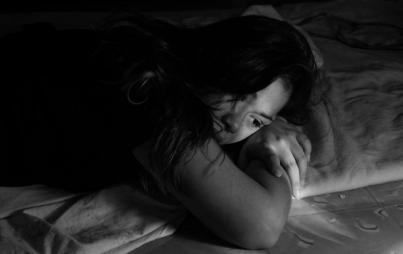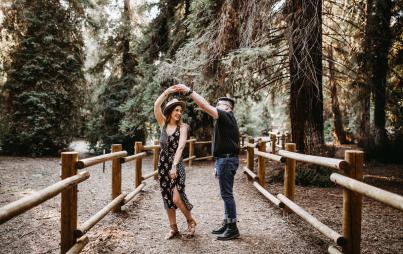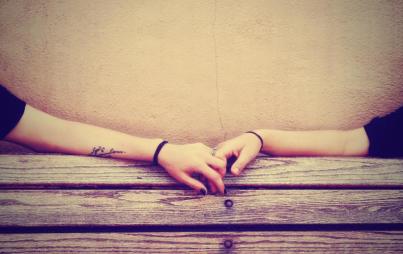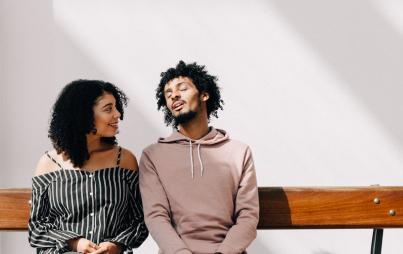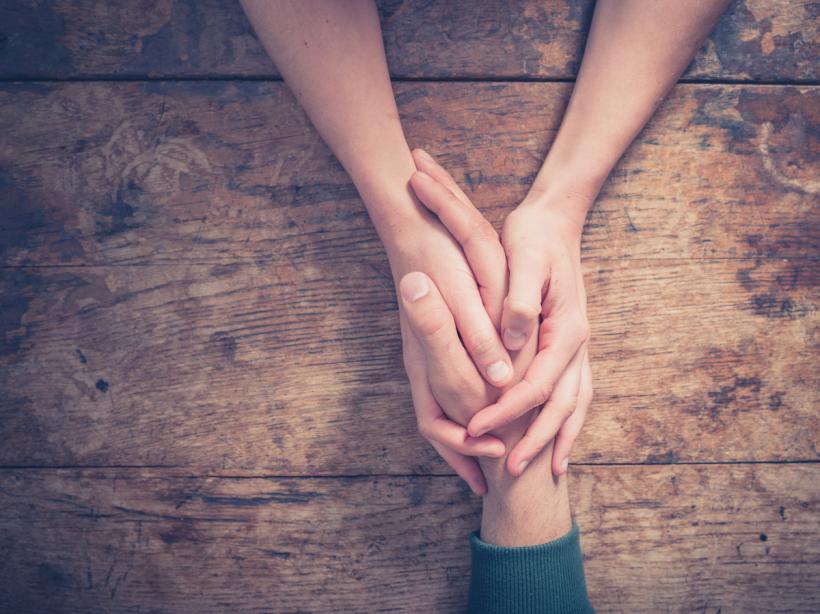
I know that there’s no quick fix for Frank, no way to save him from his suffering.
I am on my way to the closet where we keep the Ace bandages and Advil. Frank’s waiting for me in the other room, ice pack in hand, ready to wrap up whatever is ailing him and aching tonight. Sometimes it’s his shoulder and back, some days it’s one leg or both, almost always his ankles and heels.
I look at him when I walk into the room. One of the first things that you notice about Frank is that he’s strong. He works out hard five days a week and rides his bike or swims laps on just as many. He has the square jaw and strong chin of a vibrant, healthy middle-aged man with copper-tinted skin that always seems to be sun-kissed. His robust build and rugged good looks indicate a sense of strength most men his age don’t share. He’s Hemingway or Kristofferson, a wild force to be reckoned with. Once you’ve met Frank, he is hard to forget.
Joy is more readily available for some people than it is for others. If, after being active for an extended period, you know you are going to be in pain, it makes it hard to look forward to things, eliminating the excited anticipation the rest of us regularly get to participate in. If the pain makes it too hard to concentrate on the task at hand, then even the illusion of escape can seem impossible.
I didn’t know him well when it happened, he was still just the handsome big brother of a new high school friend, but the news reached us all quickly: rock climbing, compound fracture, paraplegic, wheelchair, the doctors said that Frank wouldn't walk again.
Now, 25 years later, he sits in the living room we share waiting for me to bring him the Advil. Frank proved the doctors wrong. He worked his way out of that wheelchair a long time ago. He found a way to live a full force life with the proper combination of braces and canes and prescription medication, and he can walk well enough to do it, but not nearly as easily as the rest of us.
He has to fight his way across the room; he’s had to kick his way around the world.
He leans into the ice and lets me wrap up his arm. His tattoos are a shield, a stalwart symbol of something dark but disciplined buried deep beneath the skin. He closes his eyes and takes a slow breath, sits back, and picks up his phone. He begins to thumb numbly through what feels like an endless stream of Instagram photos of men doing obnoxiously masculine things: climbing, flying, surfing, riding, running, skating, hiking. Sometimes I wish he wouldn’t look at these, but Frank has a daredevil’s heart and a mind of his own. He does what he wants, and I very rarely try to stop him. This habit is both masochistic and meditative.
His searchlight finds something in these pictures that his own life can’t always provide, some kind of borrowed escape from the pain.
I want to grab the phone and hide it. I want to write a letter to all the able bodied men Frank’s ever known and beg them to stop bragging about their adventures online, to think about what their posts might be doing to their friend. I want to have enough money in the bank to buy him every adaptive piece of sports equipment on the market. I want to quit my job and devote my days to doing whatever I can to distract him from his physical pain and mental torment. I want to scream and smash his phone against the wall above his head.
Instead I reach out and softly touch his shoulder. Sometimes that is the only thing that I can do.
It’s getting cold outside, and the days are growing shorter. Our walk tonight wasn’t as long as usual, and I’m worried that it means something, that it’s some kind of ominous sign. We started taking long walks on the bluffs before dinner as soon as he moved to LA. I noticed right away that his knee-high metal braces made his feet bleed. Whenever we’re out walking, he winces in pain while trying his best to keep up with a casual conversation or catch a quick glimpse of the Santa Monica sunset. After we complete our regular route, we hurry home, and I start dinner.
Protein’s important, and we try to limit the carbs. Chronic pain causes excess adrenal secretion of cortisol, which can make glucose serum levels unstable, so it’s important to me that he eats. When Frank’s hungry, his sensitivities are heightened, and his mood dips if we are lucky, dives if we are not. Dinner helps.
I tend to Frank in outdated ways that I suspect some of my feminist friends may misunderstand. He never asked me to do this, I simply slipped into the role, and it stuck. It’s taken me a long time to shake the feeling that by doing his laundry or making his meals I am doing something wrong. “So you make his dinner,” a skeptical female friend once asked me, “every single night?” While we third-wavers were being raised to rebel against traditional gender roles in search of self-sufficient independence, we weren’t taught how to take care of a partner who may require a bit more than the basics. I’ve always been worried that we were trained, instead, to suffer when the men in our lives don’t live up to our every empowered expectation.
I taught myself how to love Frank by washing his wounds. I know his scars just as well as his heart.
Tonight it’s his shoulder. His orthopedist says that it’s most likely a tear and Frank’s worried that if he doesn’t do something soon, it will start to get worse. He’s not a candidate for an MRI because his spine is steel, and it could heat up and burn him from the inside out, so he’ll have to get a CT scan which will mostly likely not be able to produce any definitive results. I remind myself to make this appointment and try to reassure him that it is an injury that will eventually heal — that this particular part of his pain will pass. Neither one of us mentions the way his feet are feeling. We’re both too tired to talk about that. I slip into the space next to him on the couch and pull them into my lap. He smiles.
A few months ago, Frank joined a group on a glacier hike in Montana. Someone snapped a shot of the proud pack when they reached their destination. Everyone was smiling, including Frank, happy to have made it so far, but I saw something else in his eyes, something someone else may not have noticed. I saw pain. Here are the scars to prove it. They bled through their bandages for days. He winces when I touch one, but the skin is soft and new. Here, at least, he is healed.
I know that there’s no quick fix for Frank, no way to save him from his suffering. On my worst days, I worry that there is nothing I can do, and on my best, I remember to turn toward the pain when he tries to tell me about it, instead of giving in to the stingy temptation to turn away in an attempt to protect myself from the dangerous contagion of his distress.
Joy is more readily available for some people than it is for others. If, after being active for an extended period, you know you are going to be in pain, it makes it hard to look forward to things, eliminating the excited anticipation the rest of us regularly get to participate in. If the pain makes it too hard to concentrate on the task at hand, then even the illusion of escape can seem impossible. Surfing is scary, hiking hurts, riding your bike to the beach can feel downright dangerous.
Most of us have a fairly clear cut and cavalier relationship with pain; we overestimate our ability to handle it because we’ve survived skinned knees and broken bones so gracefully, because we didn’t let that long recovery after surgery stop us. I cringe whenever I hear someone suggest that they can relate to what he’s going through. It’s easy to think that we understand it, but trust me, it is not the same thing. Overcoming chronic pain and the depression that it causes is not a matter of willpower. Being patient with a healthcare system that doesn’t provide you with the tools you need to thrive is a full-time job. Staying sane in a world where the system can so often seem stacked against you takes a superhero’s strength.
Frank fights on behalf of the people who love him every time he decides that tomorrow might be better, every time he resists the temptation to wrap that rope around his neck. His mere existence is a gift he gives us every day, and I’ll be damned if I will ever take that gift for granted.
A well known and well-meaning writer we know recently wrote a reflection on pain after suffering from an acute bout of sciatica. He asked Frank to take a look at it. “I’d love to know your thoughts,” he said, “considering.” The piece was beautiful.
It was clear that he had come very close to tapping into what Frank faces every day: the loneliness and frustration, the compassion that slips slowly in somewhere between the humbling humiliation and the empty platitudes about grace and patience that all the people in your life offer up when you’re not feeling well and need more than just advice.
The only difference, as far as I could tell, between our friend’s experience of pain and Frank’s, was that the writer’s pain eventually passed while Frank’s relentlessly persists.
He shifts in his seat and asks me to grab him more ice. I hurry to the freezer. He smiles at me. “Thanks, woman," he tries his best to remember to say. Frank leans over and pulls four Advil from the bottle. He tilts his head and takes them all at once, washing them down with a bottle of water. I sit next to him and ask him if there’s anything he wants to talk about or watch. We choose a documentary about an African marathon runner who uses his prize money to rebuild his village. Frank falls asleep before the movie is over, but I don’t wake him. Sometimes sleep is the easiest part of his day.
According to the National Institute on Drug Abuse, an estimated 2.1 million people in the United States suffer from substance use disorders related to prescription opioid pain relievers. Narcotics misuse is one of the most common forms of drug abuse in this country. Everybody knows someone who knows someone whose life has been ruined, whose mental health has been destroyed. Upon recognizing the long-term risks and the dangerous consequences of taking opiates and narcotics to manage his chronic pain and the mental health malfunctions that come with it, four years ago Frank stopped taking anything stronger than a non-steroidal anti-inflammatory and has turned to Medical Grade Cannabis instead. His new found commitment to this stance is so stoic that it can seem stubborn sometimes, even when the weed and CBD pills have eased the pain and distress enough for me to agree.
I know that there’s no quick fix for Frank, no way to save him from his suffering. On my worst days, I worry that there is nothing I can do, and on my best, I remember to turn toward the pain when he tries to tell me about it, instead of giving in to the stingy temptation to turn away in an attempt to protect myself from the dangerous contagion of his distress. I breathe deep and sit still and resist the urge to give bad advice on good things like gratitude and perspective. I try not to take his pain, or the impatient and irritable things he does when he’s in it, personally.
He wakes up and slides his shoulder out of its ice sling and heads toward the bedroom. I can tell by the way he is limping that he’s exhausted. Today, like every day, he stared it down like a fighter climbing into the ring. He flips off the light and tosses and turns and tries his best to get comfortable. I know our old mattress isn’t right and the neighbors are too noisy and the dog’s paws sound like rocks in a blender. I roll over carefully so I don’t disturb him and wish, like always, that I could do more, spend more, say more, save him. I can’t. But I can lie beside him, far enough away to give him the space he needs to stretch out, but close enough to show him that even now as he begins to drift, he’s not alone.
I am here; I try to tell him telepathically. I am hopeful, and I love you, and I’ll do anything I can to help.
It was a good day, I remind myself, easier than some. The pain was bearable, and the emotions were calm. Neither one of us was swept away in the storm. I watch the shape of his face relax as the dark does its best to relieve him. “Goodnight, Woman,” he says softly to the ceiling when he senses that I’m staring. A few minutes later we both fall asleep.




